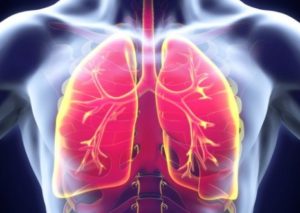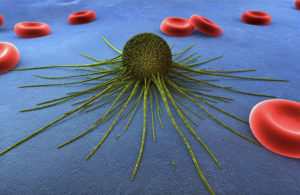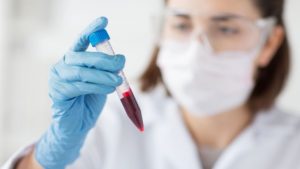Malignant Carcinoid Syndrome (CS) Samples
Bay Biosciences provides high quality, clinical grade bio-samples, cryogenically preserved tumor tissue, FFPE blocks, sera (serum), plasma and peripheral blood mononuclear cells (PBMC) biofluid specimens from patients diagnosed with Malignant Carcinoid Syndrome (CS).
The sera (serum), plasma and PBMC samples are processed from patient’s peripheral whole-blood using customized processing protocols. The Malignant Carcinoid Syndrome (CS) bio-specimens are collected from unique patients diagnosed with Malignant Carcinoid Syndrome (CS) and are provided to a valued pharmaceutical customer for translational research, genomics, proteomics and biomarker research, drug discovery and development.

Malignant Carcinoid Syndrome (CS) Overview
Carcinoid syndrome occurs when a rare cancerous tumor called a carcinoid tumor secretes certain chemicals into the bloodstream, causing a variety of signs and symptoms. Carcinoid tumors occur most commonly in the gastrointestinal tract or lungs. Malignant Carcinoid Syndrome is a paraneoplastic syndrome comprising the signs and symptoms that occur secondary to carcinoid tumors. Malignant carcinoid syndrome is characterized by an array of signs and symptoms in particular, hot, red flushing of the face; severe and debilitating diarrhea; and asthma attacks caused by vasoactive hormones secreted by metastases from carcinoid tumors. The syndrome includes flushing and diarrhea, and less frequently, heart failure, vomiting and bronchoconstriction. Carcinoid syndrome (CS) is the constellation of symptoms resulting from the action of several humoral compounds secreted endogenous, the most prominent of them being serotonin, kallikrein, tachykinins, histamine and prostaglandins.
Carcinoid Tumors are of neuroendocrine (cells originating from hormones and nervous system) origin and derive from primitive stem cells, which can give rise to multiple cell lineages. Malignant carcinoid syndrome occurs in fewer than 10% of the patients with a carcinoid tumor. Carcinoid tumors arise from neuroendocrine cells, which are widespread in the human body, especially in the organs derived from the primitive intestine. Carcinoid tumors and related syndromes may be a part of multiple endocrine neoplasia. Carcinoid syndrome typically occurs in patients who have advanced carcinoid tumor. Treatment for carcinoid syndrome usually involves treating the cancer. However, because most carcinoid tumors don’t cause carcinoid syndrome until they’re advanced, therefore a cure may not be possible.
Malignant Carcinoid Syndrome (CS) Symptoms
The signs and symptoms of Malignant Carcinoid Syndrome depend on which chemicals the carcinoid tumor secretes into the bloodstream.
The most common signs and symptoms include:
- Skin Flushing: The skin on the face and upper chest feels hot and changes color, ranging from pink to purple. Flushing episodes may last from a few minutes to a few hours or longer. Flushing may happen for no obvious reason, though sometimes it can be triggered by stress, exercise or drinking alcohol.
- Facial Skin Lesions: Purplish areas of spiderlike veins may appear on the nose and upper lip.
- Diarrhea: Frequent, watery stools sometimes accompanied by abdominal cramps and pain may occur in patients who have carcinoid syndrome.
- Difficulty Breathing: Asthma-like signs and symptoms, such as wheezing and shortness of breath, may occur at the same time you experience skin flushing.
- Rapid Heartbeat: Periods of a fast heart rate could be a sign of carcinoid syndrome.
Malignant Carcinoid Syndrome (CS) Causes
Malignant Carcinoid Syndrome is caused by a carcinoid tumor that secretes serotonin or other chemicals into the bloodstream. Carcinoid tumors occur most commonly in the lungs or in the gastrointestinal tract, including the stomach, small intestine, appendix, colon and rectum. Only a small percentage of carcinoid tumors secrete the chemicals that cause malignant carcinoid syndrome. When these tumors do secrete the chemicals, the liver normally neutralizes the chemicals before they have a chance to travel through the body and cause symptoms.
However, when an advanced tumor metastasizes (spreads) to the liver itself, it may secrete chemicals that aren’t neutralized before reaching the bloodstream. Most patients who experience carcinoid syndrome have an advanced cancer that has spread to the liver. Some carcinoid tumors don’t have to be advanced to cause carcinoid syndrome. For instance, carcinoid lung tumors that secrete chemicals into the blood do so farther upstream from the liver, which then cannot process and eliminate the chemicals.
Carcinoid tumors in the intestine, on the other hand, secrete the chemicals into blood that must first pass through the liver before reaching the rest of the body. The liver usually neutralizes the chemicals before they can affect the rest of the body. It is unknown what causes carcinoid tumors.

Malignant Carcinoid Syndrome (CS) Complications
Malignant Carcinoid Syndrome can cause the following complications:
- Carcinoid Heart Disease: Some patients with malignant carcinoid syndrome develop carcinoid heart disease. Carcinoid syndrome causes a thickening of the heart valves, making it difficult for them to function properly. As a result, the heart valves may leak. Signs and symptoms of carcinoid heart disease include fatigue and shortness of breath during physical activity. Carcinoid heart disease can eventually lead to heart failure. Medications for the heart and surgical repair of damaged heart valves may be an option in advanced carcinoid heart disease.
- Bowel Obstruction: Cancer that spreads to the lymph nodes next to the small intestine can cause narrowing and kinking of the intestine, leading to a bowel obstruction. Signs and symptoms of a bowel obstruction include severe, cramping abdominal pain and vomiting. Surgery may be necessary to relieve the obstruction.
- Carcinoid Crisis: Carcinoid crisis causes a severe episode of flushing, low blood pressure, confusion and breathing difficulty. Carcinoid crisis can occur in people with carcinoid tumors when they are exposed to certain triggers, including anesthetic used during surgery. Carcinoid crisis can be fatal.

Detailed clinical data, computerized tomography (CT), positron emission tomography (PET) scans, serotonin, urine test, elevated biomarker levels, genetic and metabolic information, skin tumor tissue biopsy, bone marrow, pathology annotations associated with the Malignant Carcinoid Syndrome patient’s specimens is provided to a valued customer for research, development and drug discovery. The Malignant Carcinoid Syndrome sera (serum), plasma and PBMC biofluid samples are processed from patients peripheral whole-blood using customized processing protocols provided by the researcher.
Bay Biosciences is a global leader in providing researchers with high quality, clinical grade, fully characterized human tissue samples, bio-specimens and human bio-fluid collections from cancer (tumor) tissue, cancer sera (serum), cancer plasma, cancer PBMC and human tissue samples from most other therapeutic areas and diseases.
Bay Biosciences maintains and manages it’s own bio-repository, human tissue bank (biobank) consisting of thousands of diseased samples (specimens) and from normal healthy donors available in all formats and types. Our biobank procures and stores fully consented, deidentified and institutional review boards (IRB) approved human tissue samples and matched controls.
All our human human tissue collections, human specimens and human bio-fluids are provided with detailed samples associated patient’s clinical data. This critical patient’s clinical data includes information relating to their past and current disease, treatment history, lifestyle choices, biomarkers and genetic information. Patient’s data is extremely valuable for researchers and is used to help identify new effective treatments (drug discovery & development) in oncology, other therapeutic areas and diseases. This clinical information is critical to demonstrate their impact, monitor the safety of medicines, testing & diagnostics, and generate new knowledge about the causes of disease and illness.
Bay Biosciences banks wide variety of human tissue samples and biological samples including cryogenically preserved -80°C, fresh, fresh frozen tissue samples, tumor tissue samples, FFPE’s, tissue slides, with matching human bio-fluids, whole blood and blood derived products such as serum, plasma and PBMC’s.
Bay Biosciences is a global leader in collecting and providing human tissue samples according to the researchers specified requirements and customized, tailor made collection protocols. Please contact us anytime to discuss your special research projects and customized human tissue sample requirements.
Bay Biosciences provides human tissue samples (human specimens) from diseased and normal healthy donors; including peripheral whole-blood, amniotic fluid, bronchoalveolar lavage fluid (BAL), sputum, pleural effusion, cerebrospinal fluid (CSF), serum (sera), plasma, peripheral blood mononuclear cells (PBMC’s), saliva, Buffy coat, urine, stool samples, aqueous humor, vitreous humor, kidney stones, renal calculi, nephrolithiasis, urolithiasis and other bodily fluids from most diseases including cancer. We can also procure most human bio-specimens and can do special collections and requests of human samples that are difficult to find. All our human tissue samples are procured through IRB approved clinical protocols and procedures.
In addition to the standard processing protocols Bay Biosciences can also provide human plasma, serum, PBMC bio-fluid samples using custom processing protocols, you can buy donor specific sample collections in higher volumes and specified sample aliquoting from us. Bay Biosciences also provides human samples from normal healthy donors, volunteers, for controls and clinical research, contact us Now.
日本のお客様は、ベイバイオサイエンスジャパンBay Biosciences Japan またはhttp://baybiosciences-jp.com/contact/までご連絡ください。


